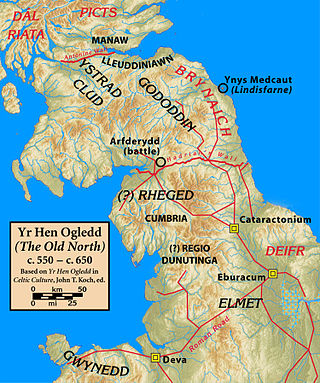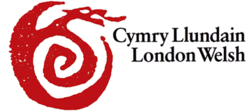
City Hall is a municipal building in Cardiff, Wales, UK. It serves as Cardiff's centre of local government. It was built as part of the Cathays Park civic centre development and opened in October 1906. Built of Portland stone, it is an important early example of the Edwardian Baroque style. It is a Grade I listed building.

The Honourable Society of Cymmrodorion, often called simply the Cymmrodorion, is a London-based Welsh learned society, with membership open to all. It was first established in 1751 as a social, cultural, literary and philanthropic institution. It fell into abeyance between 1787 and 1820, and again between 1843 and 1873. In its second and third incarnations its interests have been predominantly cultural and antiquarian. The present society claims continuity from that founded in 1751, although the three successive societies have in fact been slightly different in character and aims.

Yr Hen Ogledd, meaning the Old North, is the historical region that was inhabited by the Brittonic people of sub-Roman Britain in the Early Middle Ages, now Northern England and the southern Scottish Lowlands, alongside the fellow Brittonic Celtic Kingdom of Elmet, in Yorkshire. Its population spoke a variety of the Brittonic language known as Cumbric which is closely related to, if not a dialect of Old Welsh. The people of Wales and the Hen Ogledd considered themselves to be one people, and both were referred to as Cymry ('fellow-countrymen') from the Brittonic word combrogi. The Hen Ogledd was distinct from the parts of Great Britain inhabited by the Picts, Anglo-Saxons, and Scoti.
This article is about the particular significance of the year 1990 to Wales and its people.

This article is about the particular significance of the year 1931 to Wales and its people.
This article is about the particular significance of the year 1929 to Wales and its people.
Richard Morris was a Welsh writer and editor, a younger brother of Lewis Morris.
This article is about the particular significance of the year 1909 to Wales and its people.
This article is about the particular significance of the year 1908 to Wales and its people.
This article is about the particular significance of the year 1894 to Wales and its people.
This article is about the particular significance of the year 1820 to Wales and its people.
The London Welsh School is a Welsh medium primary school in London, England. Welsh is the language predominantly used for all classes and activities. The school offers a bilingual education to children aged four to 11. The school also has a pre-school class for three and four-year-old children, and a baby and toddler group called Miri Mawr that meets on Monday mornings.

This article is about the particular significance of the year 1787 to Wales and its people.
This article is about the significance of the year 1776 to Wales and its people.

The Cambrian Archaeological Association was founded in 1846 to examine, preserve and illustrate the ancient monuments and remains of the history, language, manners, customs, arts and industries of Wales and the Welsh Marches and to educate the public in such matters. The association's activities include sponsoring lectures, field visits, and study tours; as well as publishing its journal, Archaeologia Cambrensis, and monographs. It also provides grants to support research and publications.
The Dictionary of Welsh Biography (DWB) is a biographical dictionary of Welsh people who have made a significant contribution to Welsh life over seventeen centuries. It was first published in 1959, and is now maintained as a free online resource.
The Gwyneddigion Society was a London-based Welsh literary and cultural society. The original society was founded in 1770 and wound up in 1843. It was briefly revived in 1978. Its proceedings were conducted through the medium of Welsh.
The Honourable and Loyal Society of Antient Britons was a London-based Welsh social, cultural, and philanthropic society, which was in existence from 1715 until the end of the 18th century.
Owen Picton Davies, was a Welsh Chairman and Director of Companies and a Proprietor of Hotels. He was also a Liberal Party politician.

Aberystwyth Old Students' Association, founded in 1892, is Aberystwyth University's alumni association and is one of the oldest such associations in the United Kingdom. It currently has more than 10,000 Members and 100,000 Associate Members worldwide.








